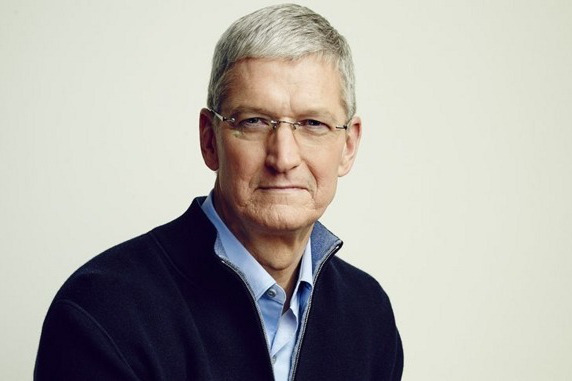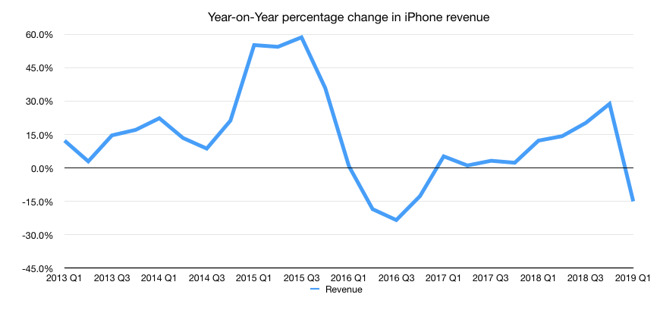Cook confirms iPhone upgrades are on the decline as users 'hang on' to hardware for longer...
During Apple's quarterly financial results call, CEO Tim Cook reported that iPhone sales are down in part because of existing users who were on subsidized contracts are now finding unbundled prices too expensive.

Asked by analysts about why iPhone sales were lower than expected, Cook revealed that the time between users upgrading their phones has lengthened. He said that this increased time means that some users now looking to upgrade were only now coming off previously subsidized contracts that had made the initial cost of iPhone much less.
"We do design our products to last as long as possible," Cook said. "Some people hang on to those for the life of the product and some people trade them in and then that phone is redistributed to someone else. The upgrade cycle has extended, there's no doubt about that."
Cook thinks price is a factor and that this was especially true outside the U.S. He said that comparing the pricing of this year's iPhones to last year's, at least in America, shows "actually a pretty small difference." Outside the continental U.S., though, he said that some countries were affected by currency exchange fluctuations which meant Apple needed to "essentially absorb part or all of the foreign currency moves."

However, while acknowledging the importance of the sales price, Cook stressed that he thinks "the subsidy is probably the bigger of the issues in the developed markets."
"Even though the subsidy has gone away for a period of time, if you're a customer whose last purchase was a 6S or a 6 or even in some cases a 7, you may have paid $199 for it. Now we're in the unbundled world, it's obviously much more than that," he said.
Cook revealed that Apple has "a number of actions to address that, including the trade-in and installment payments."
"So where it goes in the future, I don't know," he concluded. "But I am convinced that making a great product that is high quality, that is the best thing for the customer. We work for the user and so that's the way that we look at it."

Asked by analysts about why iPhone sales were lower than expected, Cook revealed that the time between users upgrading their phones has lengthened. He said that this increased time means that some users now looking to upgrade were only now coming off previously subsidized contracts that had made the initial cost of iPhone much less.
"We do design our products to last as long as possible," Cook said. "Some people hang on to those for the life of the product and some people trade them in and then that phone is redistributed to someone else. The upgrade cycle has extended, there's no doubt about that."
Cook thinks price is a factor and that this was especially true outside the U.S. He said that comparing the pricing of this year's iPhones to last year's, at least in America, shows "actually a pretty small difference." Outside the continental U.S., though, he said that some countries were affected by currency exchange fluctuations which meant Apple needed to "essentially absorb part or all of the foreign currency moves."

However, while acknowledging the importance of the sales price, Cook stressed that he thinks "the subsidy is probably the bigger of the issues in the developed markets."
"Even though the subsidy has gone away for a period of time, if you're a customer whose last purchase was a 6S or a 6 or even in some cases a 7, you may have paid $199 for it. Now we're in the unbundled world, it's obviously much more than that," he said.
Cook revealed that Apple has "a number of actions to address that, including the trade-in and installment payments."
"So where it goes in the future, I don't know," he concluded. "But I am convinced that making a great product that is high quality, that is the best thing for the customer. We work for the user and so that's the way that we look at it."

Comments
So instead of giving my wife my old phone (like I usually) do, I got a $29 battery replacement to go in her iPhone 7 (80% health) and I had my iPhone X battery replaced as well (even at 88% for another $29). That should keep up going through 2019 and perhaps beyond. The phones work great, so really no need to upgrade unless Apple puts out something truly remarkable this year.
I truly hope -- and expect -- that some heads will roll in marketing.
That iPhone 4 in it's 4th year was really dog slow. At times I wanted to throw it againt the wall and break it and then I'd be forced to buy I newer iPhone. In the end, I had it over 4 years and then sold it for $202!!! Yep!!! Then I got the iPhone 6 and had that for 4 years. That phone was actually still pretty usable. I could have gone another year no problem if I wanted. My Dad still has his and now in his 5th year. I ended up selling my iPhone 6 for $180.
You have people saying why do you need all that speed. It's overkill!!!! This is why, as the phone ages, the apps get larger and more complex as does iOS which gets makes your phone slower and slower every year normally. That iPhone 4 had Apple's first custom CPU, the A4, which really wasn't that much changed over stock version of the ARM CPU. Since then Apple's gone way past that as the A* processors have gotten faster and faster. That helped with that 4 year old iPhone 6 to still be a usable phone. If you buy a phone every year or every other year, it may not seem to matter to you so much. I expect my iPhone XS, 4 years from now to run a little faster than the iPhone 6 did after 4 years. I'll then sell it and buy my new iPhone in 2022 whatever Apple ends up calling it.
Just like Windows 95, 98, XP, 7, 8, 10, all really needing faster and faster computers as Windows grew and needing a faster CPU, more ram, and faster storage and so on and so on. It holds true with any OS. The hardware demands continue to grow with the OS.
The new iPhones are too big, too heavy and way too expensive!
My GF has a 6 and we went to have the battery changed. It was denied and she then told me she had spilt a bottle of water on it. Oh well!